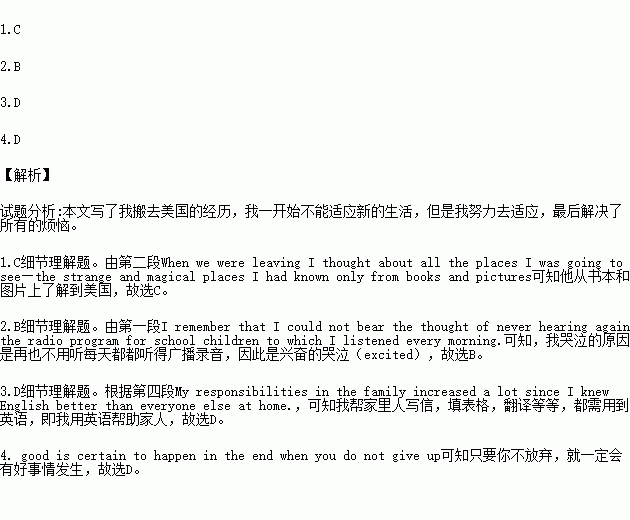题目内容
How I Turned to Be Optimistic
I began to grow up that winter night when my parents and I were returning from my aunt's house, and my mother said that we might soon be leaving for America. We were on the bus then. I was crying, and some people on the bus were turning around to look at me. I remember that I could not bear the thought of never hearing again the radio program for school children to which I listened every morning.
I do not remember myself crying for this reason again. In fact, I think I cried very little when I was saying goodbye to my friends and relatives. When we were leaving I thought about all the places I was going to see-—the strange and magical places I had known only from books and pictures. The country I was leaving never to come back was hardly in my head then.
The four years that followed taught me the importance of optimism, but the idea did not come to me at once. For the first two years in New York I was really lost—having to study in three schools as a result of family moves. I did not quite know what I was or what I should be. Mother remarried, and things became even more complex for me. Some time passed before my stepfather and I got used to each other. I was often sad, and saw no end to "the hard times."
My responsibilities in the family increased a lot since I knew English better than everyone else at home. I wrote letters, filled out forms, translated at interviews with Immigration officers, took my grandparents to the doctor and translated there, and even discussed telephone bills with company representatives.
From my experiences I have learned one important rule: almost all common troubles eventually go away! Something good is certain to happen in the end when you do not give up, and just wait a little! I believe that my life will turn out all right, even though it will not be that easy.
1.How did the author get to know America?
A. From her relatives. B. From her mother.
C. From books and pictures. D. From radio programs.
2.Upon leaving for America, the author felt_______.
A. confused B. excited C. worried D. amazed
3.What can we learn about the author from Paragraph 4?
A. She worked as a translator.
B. She attended a lot of job interviews.
C. She paid telephone bills for her family.
D She helped her family with her English.
4.The author believes that______.
A. her future will be free from troubles
B. it is difficult to learn to become patient
C. there are more good things than bad things
D. good things will happen if one keeps trying
 阅读快车系列答案
阅读快车系列答案教师是否应该没收学生的课外读物呢?为此,你班针对这一问题进行讨论。请你根据表格中的提示,向某英文报社介绍同学们的观点,并表达自己的看法。
赞成没收的理由 | 反对没收的理由 | 你的看法 |
1、浪费时间 2、促进学习 3、关心学生 | 1、拓展视野 2、放松身心 3、激化师生矛盾 | ? |
注意:1、文章必须包括表中的全部内容;
2、词数100左右 ;
3、参考词汇 没收 confiscate; 课外读物 outside reading


 e from the teachers to my questions,not even a one-word response.
e from the teachers to my questions,not even a one-word response.